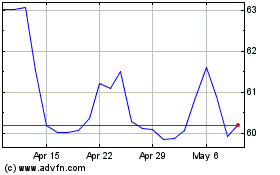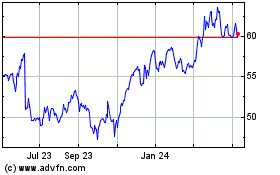Stock Exchanges Squabble Over End-of-Day Auctions
June 15 2017 - 12:07PM
Dow Jones News
By Alexander Osipovich
The New York Stock Exchange and Nasdaq Inc. slammed a plan by
rival Bats to shake up the crucial closing auctions that happen
daily at 4 p.m. and determine prices for thousands of stocks.
Bats's proposal would "introduce undesirable market
fragmentation and volatility," NYSE said in a letter to the
Securities and Exchange Commission posted online Thursday. In a
similar letter, Nasdaq said the plan was "harmful to investors" and
"would establish a dangerous precedent."
The proposal, which awaits SEC approval, would give traders a
new way to buy and sell shares of companies listed on NYSE and
Nasdaq at the daily closing price without paying fees to NYSE or
Nasdaq.
Bats said it would address the criticism in letters to the SEC.
"We expected an active comment period and look forward to
responding in this healthy debate," a spokeswoman said.
The growing popularity of exchange-traded funds and index-based
strategies has increased the importance of the closing auctions in
recent years. That is because index-fund managers often seek to buy
and sell stocks at prices close to the daily settlement prices,
which determine the level of the indexes they are tracking.
For instance, an unusually high 39% of the trading volume in
Yahoo Inc. shares on Tuesday took place in its closing auction,
according to data from brokerage ITG. The spike came as Verizon
Communications Inc. completed its takeover of Yahoo's main
businesses, which led benchmark providers FTSE Russell and MSCI to
remove it from their indices. That in turn prompted funds tracking
those indices to sell Yahoo, traders and analysts said.
On average, 5.9% of the volume in NYSE-listed securities this
year has taken place in the closing auction, up from 3.6% in 2012,
according to NYSE. For Nasdaq-listed securities, the share of
volume at the close rose from 3% to 4.6% over the same period,
according to Nasdaq.
Bats's plan threatens to erode NYSE and Nasdaq's bottom lines,
said Rich Repetto, an analyst at Sandler O'Neill + Partners. "In
the worst-case scenario, they could lose some profitable trading
revenue with a knock-on effect on market-data revenue."
NYSE and Nasdaq's control over closing auctions is a vestige of
the duopoly they enjoyed until the mid-2000s, when regulations
forced greater competition between exchanges.
During the trading day, a stock can be traded on any exchange.
But at the close, it reverts to the exchange where it is listed.
That means NYSE has an effective monopoly on closing auctions for
shares of companies listed on the Big Board, while Nasdaq has a
similar grip on closing auctions for Nasdaq-listed stocks.
Increasing fees for trading at the close have led to complaints
on Wall Street. "Costs associated with primary markets closing
auctions have been steadily increasing in the absence of
competitive alternatives," the Securities Industry and Financial
Markets Association, a lobby group for financial firms, said in a
letter Wednesday to the SEC.
Nasdaq has increased the maximum fee for trading at the close by
60% in the past three years, while NYSE has raised it 16% over the
same period, according to SEC filings. The two exchange groups also
offer discounted rates for higher-volume traders, and NYSE offers
cheaper rates to traders who use floor brokers.
Bats said last month that its plan would create a "competitively
priced alternative" to NYSE and Nasdaq's closing auctions.
If approved, the plan would let Bats create a mechanism to
replicate market-on-close orders in NYSE and Nasdaq's closing
auctions. Such orders allow traders to buy or sell NYSE- or
Nasdaq-listed securities at whatever the day's final closing price
is.
The plan wouldn't affect limit-on-close orders, in which traders
specify the highest price at which they are willing to buy the
stock, or the lowest price at which they are willing to sell. By
leaving such orders untouched, Bats would avoid "distorting auction
price formation," it said last month.
NYSE and Nasdaq disagree, saying it is essential to keep
closing-auction trades concentrated in one place. Nasdaq, in its
letter to the SEC, also accused Bats of "unabashedly free-riding"
on Nasdaq's closing auction.
Bats was acquired this year by Chicago-based CBOE Holdings
Inc.
Write to Alexander Osipovich at
alexander.osipovich@dowjones.com
(END) Dow Jones Newswires
June 15, 2017 11:52 ET (15:52 GMT)
Copyright (c) 2017 Dow Jones & Company, Inc.
Nasdaq (NASDAQ:NDAQ)
Historical Stock Chart
From Mar 2024 to Apr 2024

Nasdaq (NASDAQ:NDAQ)
Historical Stock Chart
From Apr 2023 to Apr 2024
